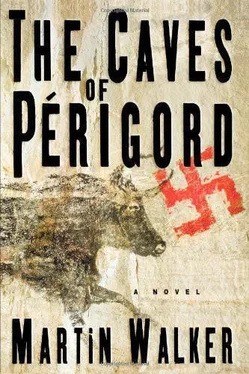“Here we are,” said Malrand. “I come here from time to time. It’s a lovely spot. The first time was with your two fathers, in September of 1944, after they had liberated Toulouse and got me out of prison. We collected all the cartridge cases, and tidied up the mound of rocks, over there behind that leaning tree.”
Lespinasse opened the picnic basket, and took out a small silver tray, some flutes, and a bottle of champagne. The cork popped noisily, and he poured five glasses. One for himself, Lydia noted, approvingly.
“Was that the tree that was blown aside by the German mortar?” asked Manners, strolling across to it, as Lespinasse served the champagne.
“Yes, and still alive. I suppose the taproot gets water.” The tree seemed to emerge from a large, grass-covered mound. There was no sign of fissure in the rock.
“Well, a toast to your dear father, and may he rest in peace, along with yours, Lespinasse,” said Malrand, sipping and surveying the grass, the trees, the sky, as if it were simply marvelous to be alive on such a day.
“You were going to tell us the second thing you wanted, Francois,” said Lydia, her curiosity too insistent to be silent.
“Yes, I was,” he said slowly. “I spent a lot of time dreading that this tale would come out, and now it has, I’m not sure it will be so bad after all. And above all, I think I want to look at the portraits of our ancestors, that first Frenchwoman and Frenchman, those first children of Perigord, once again before I die.”
He strolled over to the grassy mound and rested his hand against the leaning tree.
“I particularly want to see her again, the woman of the cave. I have carried a great tendresse for that woman since 1944. So did my English friend, your father. And the older he got, as we sat up late at night and talked about it all, the more he seemed to confuse her with his Sybille. Or the more they seemed to come together in his mind. And you can appease an old man’s vanity by confirming or refuting something that has nagged me for over fifty years. Something your father said, Lespinasse, about the portrait of the man looking rather like me. I’d feel very honored if it were true.”
He raised his glass in salute to the mound. “To them, our ancestors, whoever they were,” he said, and drank.












